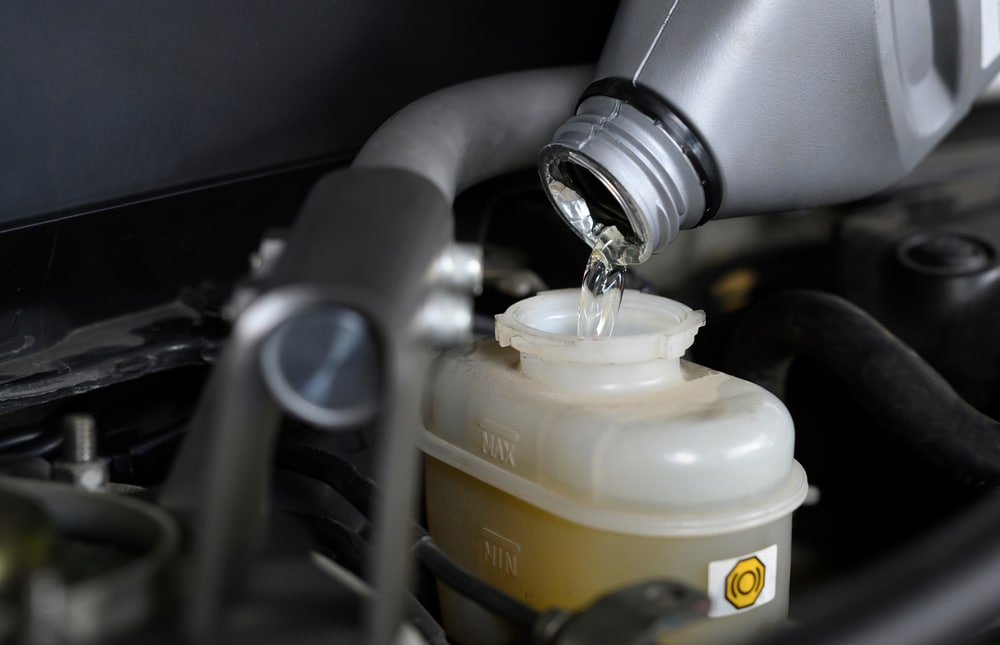Brake Fluid
Every time you press the brake pedal, brake fluid plays a crucial role in stopping your car safely. Over time, however, it can degrade, absorb moisture, and lose the hydraulic strength needed for quick and reliable braking.
For this reason, regular brake fluid inspections and changes go beyond a simple service task – they’re essential for safe driving.
At Roade Main Garage, we offer professional brake fluid checks and changes, ensuring your vehicle’s braking system remains dependable. We follow manufacturer guidance and provide honest advice. Call 01604 862262 to schedule your brake fluid service today.

The Critical Job of Brake Fluid
Brake fluid is the link between pressing your brake pedal and bringing your car to a safe stop. It provides a firm pedal feel, prevents internal wear, and ensures the braking system responds when it matters most.
As a hydraulic fluid, brake fluid transfers the force from your foot on the brake pedal through the system, allowing callipers or wheel cylinders to press the pads or shoes against the discs or drums. Because it doesn’t compress, the pressure is delivered instantly and evenly, giving you reliable braking performance every time.
Beyond pressure transfer, brake fluid helps lubricate moving parts and prevents corrosion within the system. It’s designed to operate under extreme heat and pressure, making it essential to keep the fluid in top condition for safe and consistent braking.
What Brake Fluid Does When You Press the Brake Pedal
Brake fluid is what links your foot on the brake pedal to the stopping power of your vehicle. When you press the pedal, you’re not applying force directly to the wheels. Instead, the movement activates a master cylinder that compresses the brake fluid, creating hydraulic pressure.
This pressure is transmitted through the brake lines to the callipers or wheel cylinders, where it forces the brake pads or shoes to clamp onto a brake disc or drum. The resulting friction is what brings your vehicle to a controlled stop.
When brake fluid is healthy, it remains incompressible, ensuring that pressure is delivered evenly and without delay, giving you a smooth and predictable braking feel.
Brake fluid also underpins modern systems like ABS and electronic stability systems, which require precise hydraulic performance to operate correctly. It may seem like a minor element, but its function is essential for safe, reliable braking.
The Location of Your Brake Fluid Reservoir
Open the bonnet of your vehicle, and you’ll usually find the brake fluid reservoir towards the back of the engine bay, typically on the driver’s side. It’s a small, translucent container designed to make fluid level checks quick and simple.
Inside the reservoir is a rubber seal or diaphragm that stops air and moisture from entering. This is important because brake fluid naturally absorbs water, which can reduce its effectiveness if not monitored and replaced at the correct intervals.
The semi-transparent design allows a visual check of fluid levels, but to assess its colour or condition, the cap must be removed during a service.
Though small, the reservoir is a key indicator of braking health. Any noticeable drop in level or change in fluid colour should be checked promptly by the team at Roade Main Garage.
The Main Types of Brake Fluid and Their Roles
Brake fluid isn’t universal — different grades are designed for specific vehicles and driving conditions. Using the wrong type can reduce braking performance or even damage the braking system. Understanding the differences is key to keeping your vehicle safe.
Here’s an outline of the main types:
- DOT 3 Brake Fluid – A glycol-based fluid with a lower boiling point, commonly used in older vehicles without modern braking systems. It absorbs moisture, which reduces performance over time.
- DOT 4 Brake Fluid – Found in most modern cars, DOT 4 has a higher boiling point than DOT 3, making it ideal for vehicles with ABS or traction control. Like DOT 3, it absorbs moisture and needs regular replacement.
- DOT 5 Brake Fluid – A silicone-based fluid that does not absorb water. It’s mainly used in classic or specialist cars and cannot be mixed with DOT 3 or DOT 4, as this can lead to seal failure and reduced braking power.
- DOT 5.1 Brake Fluid – Offers the high performance of DOT 5 but is glycol-based like DOT 3 and 4, which means it is compatible with modern braking systems needing better thermal stability.
At Roade Main Garage, we always use the correct brake fluid grade to ensure your braking system remains responsive and safe.
What Causes Brake Fluid to Fail
Brake fluid is built to withstand demanding conditions, but over time, its ability to perform begins to decline. Heat, moisture, and contaminants all contribute to this process, and if not addressed, it can put your braking system at risk.
The following issues can compromise your brake fluid:
Moisture Absorption – Brake fluid is hygroscopic, meaning it naturally absorbs water from the air, even through the smallest openings in seals and hoses. This added moisture lowers the boiling point, making vapour lock more likely. Vapour lock occurs when the fluid boils during heavy braking, creating bubbles that prevent pressure from reaching the brakes effectively.
Heat and Pressure – The intense heat generated whenever you brake gradually breaks down the fluid’s chemical stability. Over time, this makes the fluid less capable of withstanding high stress.
Chemical Stability and Additives – Brake fluids contain additives to prevent corrosion and keep seals protected. These additives lose their effectiveness as the fluid ages, leaving components exposed to damage.
Contamination – Particles from seals, rust flakes, or traces of incorrect fluid can contaminate the system, reducing braking precision and harming sensitive parts.
Old or Incorrect Fluid – Using the wrong brake fluid or failing to replace it on time can affect ABS, traction control, and brake pressure regulation. While the brakes may seem fine during normal driving, they can fail during emergency stops.
At Roade Main Garage, we check the quality of your brake fluid during every service and replace it when needed to keep your brakes safe and dependable.
How to Recognise Worn or Failing Brake Fluid
Brake fluid doesn’t have its own warning system, so keeping an eye on its condition is essential. Regular checks at Roade Main Garage help ensure your brake fluid is replaced before it affects your braking performance.
Watch for these signs that your brake fluid may need changing:
Soft or Spongy Brake Pedal – If the brake pedal feels less firm or needs extra pressure, moisture or air could be interfering with the fluid’s ability to transmit force effectively.
Brake or ABS Lights – Some vehicles display dashboard warnings when brake fluid levels drop or pressure becomes uneven. These warnings shouldn’t be ignored.
- Burnt or Harsh Smell – A chemical or burnt odour from the fluid when the reservoir cap is removed can indicate deterioration.
- Dark or Contaminated Fluid – Fresh brake fluid is clear or pale. If it looks cloudy or dark, it may have absorbed moisture or debris and should be replaced.
If you spot any of these issues, book a brake fluid inspection with Roade Main Garage. Our expert team will keep your braking system safe and efficient.
The Hidden Risks of Worn Brake Fluid
Worn brake fluid doesn’t show obvious warning signs, which is why it can be so dangerous. As it absorbs moisture and deteriorates, its ability to transmit hydraulic pressure weakens, affecting your stopping power when you need it most.
What may start as a slight change in pedal feel or longer stopping distances can lead to severe problems, including corrosion of seals and callipers. In extreme cases, worn brake fluid can cause brake fade or even complete brake failure during emergency stops. Scheduling regular inspections where you’ll have your brake fluid changed is the easiest way to stay protected.
At Roade Main Garage, we test brake fluid during every service and replace it when needed to keep your brakes responsive and reliable. A simple brake fluid change can prevent costly repairs and protect your safety.
Keep Your Brakes Safe – Book a Service
Brake fluid naturally absorbs moisture and breaks down over time, reducing its ability to deliver the hydraulic pressure your brakes rely on. If it’s not checked or replaced when needed, it can lead to reduced braking performance or even complete brake failure in extreme situations. Regular servicing is the easiest way to prevent these risks.
At Roade Main Garage, we offer expert brake fluid checks and changes using manufacturer-approved specifications. Our skilled technicians will test the condition of your brake fluid during every service and replace it when necessary to keep your brakes sharp and dependable.
Why choose Roade Main Garage?
- Manufacturer-recommended brake fluid and processes
- Experienced, reliable technicians
- Brake fluid checks included in routine servicing
- All work backed by a 12-month parts and labour guarantee
Don’t take chances with your safety. Book your brake fluid service with Roade Main Garage in Northampton today.



